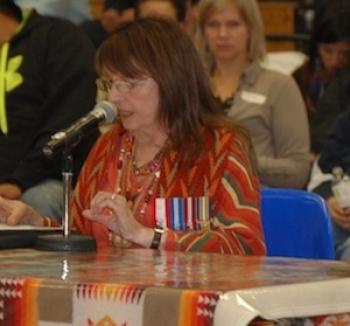Image Caption
By Shari Narine
Windspeaker.com Contributor
EDMONTON
The move to examine “carding” to implement guidelines for police interactions with the public should mean Indigenous women are no longer stopped on the streets by police simply for the color of their skin.
Alberta’s Aboriginal Commission on Human Rights and Justice Chair Muriel Stanley Venne is encouraged by the province’s intentions.
Data obtained by CBC News from the Edmonton Police Service through a freedom of information request shows that in 2016, Indigenous women were nearly 10 times as likely to be checked or carded as were white women.
“It is a really shocking situation in which Aboriginal women are singled out for nothing,” said Stanley Venne, who is also founder of the Institute for the Advancement of Aboriginal Women. “The racism behind it is very obvious.”
About a year ago, both the commission and the institute brought the issue of street checks to the forefront. Their efforts, however, met with little response, says Stanley Venne.
A year later, that tide has turned and she says that may be because of outcries from other major cities, including Ontario, which earlier this year implemented guidelines outlining when and how identifying information can be gathered.
“We’ve been hearing from a number of different community groups… There’s a lot of strong feelings… and at the end of the day everyone wants to live in safe communities and everyone wants to make sure everyone’s rights are respected, so I think we can get to a place where people have a better common understanding,” said Justice Minister and Solicitor General Katheen Ganley.
On Aug. 24, Ganley announced that the Alberta government would invite about 100 community groups to have input into establishing guidelines that will deal with “non-arrest, non-detention interactions.”
She said that community groups – which includes treaty organizations - would complete a “qualitative” survey that asks for “lived experiences” and personal views on such actions as being asked for a name versus being asked for identification.
While the surveys are targeting organizations, Ganley says individuals can respond as well. She anticipates the surveys will go out by the end of August, with about six weeks provided for response time.
The information will be gathered, draft guidelines drawn up and then in-person sessions will be held for further input in order to create an “Alberta specific model.”
Ganley stresses that new guidelines would not impact what is already prohibited under the Charter of Rights and Freedoms, such as a search without reasonable suspicion.
The new guidelines will still allow police to talk to the public.
“What we don’t want to stop is the ability of the police to interact with anyone who’s not detained because that is the basis of community policing,” said Ganley.
She says she is hopeful the survey will identify areas of “overlap” and there will be a distinction between community policing and non-arrest, non-detention interactions.
“We’re hoping to have a standard approach so that the public and the police and everyone understand what is allowed and what isn’t allowed … and that people will have an understanding of what their rights are,” said Ganley.
In Ontario, the new guidelines require that the police inform anyone they stop that they are not required to provide identifying information.
Ganley hasn’t set a timeline as to when the full process for establishing the new guidelines will be completed. She does say, however, that it is not expected to be a multi-year process.

